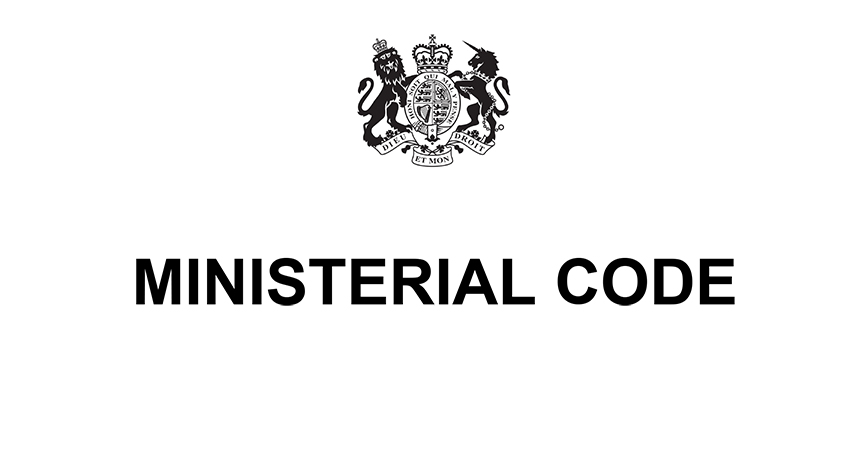Ministerial Code “not fit for purpose”, Penman tells Standards Committee

FDA General Secretary Dave Penman has given evidence to the Committee on Standards in Public Life, advising that the Ministerial Code “is not fit for purpose” when it comes to investigating bullying and harassment allegations.
The online evidence session was focussed on the Ministerial Code as part of the Committee’s landscape review of standards. When asked about the relationship between FDA members and ministers, Penman said that whenever he speaks to civil servants they have “nothing but respect” for the job that ministers have to do.
“In the majority of cases, civil servants see that ministers are doing a really difficult job and trying to do it well,” he explained. “That’s why I think then it does fall down and there are issues that come to the fore, it’s really important that they’re dealt with well because otherwise it taints the majority of behaviours around ministerial conduct.”
The FDA has been publicly critical of the Ministerial Code as a mechanism for dealing with bullying and harassment complaints made against ministers and Penman reiterated those points today, telling the Committee that “it’s an opaque system” that “is not fit for purpose”. The FDA General Secretary suggested that the process for dealing with such complaints should to be “separate” from the Ministerial Code to give more power to those raising complaints.
“You have this situation where people are very powerful in a workplace setting,” he added. “There is a challenge around the regulation of those individuals and where that’s wielded disproportionately or inappropriately, how is that then challenged?”
Earlier in the day, the Committee had heard from two former Independent Advisers on Ministers’ Interests, Sir Alex Allan and Sir Philip Mawer. When giving evidence, Sir Alex said he thinks “there is a case now for giving the independent adviser the role of initiating investigations”. This was a view shared by Sir Philip, who claimed that “it would give very significant reassurance to the public” and take investigations “out of the immediate political maelstrom”.
Sir Alex qualified his comment by saying that “it must be the Prime Minister who decides on the sanctions” but it would help if there were a clear range of actions that could be taken and that the adviser’s advice should always be published.
“I can see a case for saying that the adviser should deal with the facts and whether the actions amount to a breach… and the Prime Minister then decides what to do,” he added.
When questioned on this topic, Penman stressed that “the idea that an investigation can only be started by the person who is going to make the final decision on it just creates such an obvious conflict of interest”. He told the Committee that he supports the idea of an independent investigator having the power to initiate investigations, so that it is not solely in the hands of the Prime Minister.
Penman also agreed with the sentiment that the advice the Prime Minister received should be published in some form. While acknowledging there is some sensitive information that may not be suitable to be put into the public domain, he said that a commitment to always publish a transparent outcome of investigations “would be critical to ensuring the confidence” in the process.
Discussing how sanctions and a different kind of independent investigation process may work in a practical sense, Penman drew on the FDA’s experience in Parliament, where years of campaigning finally led to the implementation of the Independent Expert Panel (IEP) to deal with complaints about MPs’ behaviour in June 2020.
He described it as “a long slog in Parliament to get to this point” but was confident in saying that the situation had “absolutely” improved following the introduction of the IEP. “What was critical in Parliament was the issue of independent decision making.”
A fully independent process was a key demand of the FDA’s campaign in Parliament and helps staff to have confidence in the process. Penman added that when you don’t have confidence in the process for dealing with complaints, “people simply do not come forward”.
“[Staff] need to know from the start where to raise a complaint to the end of the process, how is the decision made?”
Penman also said that the FDA supports there being a range of sanctions if a minister is found to have breached the Ministerial Code. He accepts that it’s “quite difficult” to develop appropriate sanctions but, as the union has found in Parliament, it’s “not impossible”.
When asked to compare the process now in place in Parliament to that which applies to ministers, he said the standards regime in Parliament is “undoubtedly” better than it is for ministers.
He illustrated this by saying that if a minister behaved in one way to Parliamentary staff and then walked up Whitehall and did the same to a civil servant “you’ve got two very different standards applying, separated by 100 yards”.
“That demonstrates why you need to separate these issues from the Ministerial Code and create a standard and a process that is centred around those who are going to challenge inappropriate behaviour.”
Related News
-

“An opportunity missed”
Dave Penman has labelled new Commission “an opportunity missed” and called on the government to go further and look at parliament for a more independent system.
-

FDA reiterates calls for a full independent bullying and harassment policy in the Senedd
Appearing before the Senedd Standards of Conduct Committee, FDA National Officer Jane Runeckles made clear that the process for dealing with bullying, harassment and sexual misconduct must be independent from MSs.
-

“Significant victory” for FDA members: MPs vote to introduce risk-based exclusion at the point of arrest
FDA welcomes MPs vote to introduce a formal mechanism to risk assess any MP at the point of arrest.